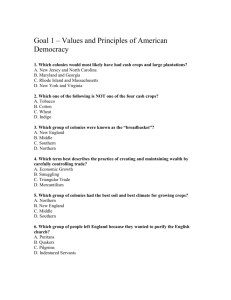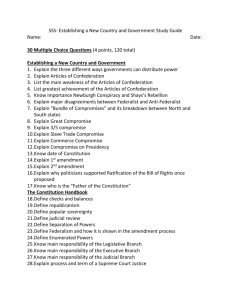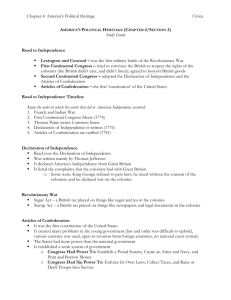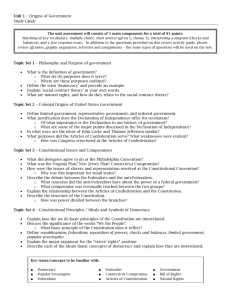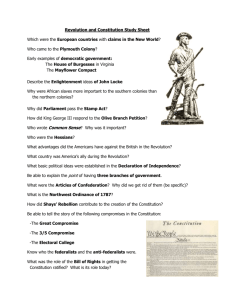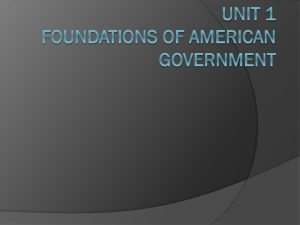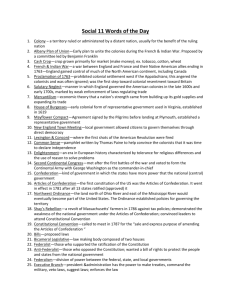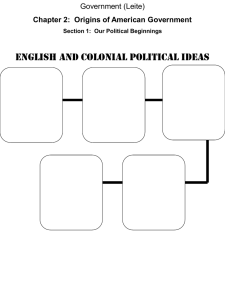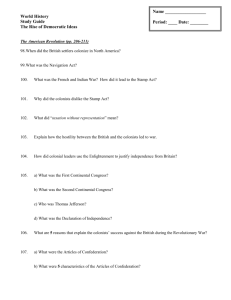Colonialism & the Foundations of American Democracy
advertisement
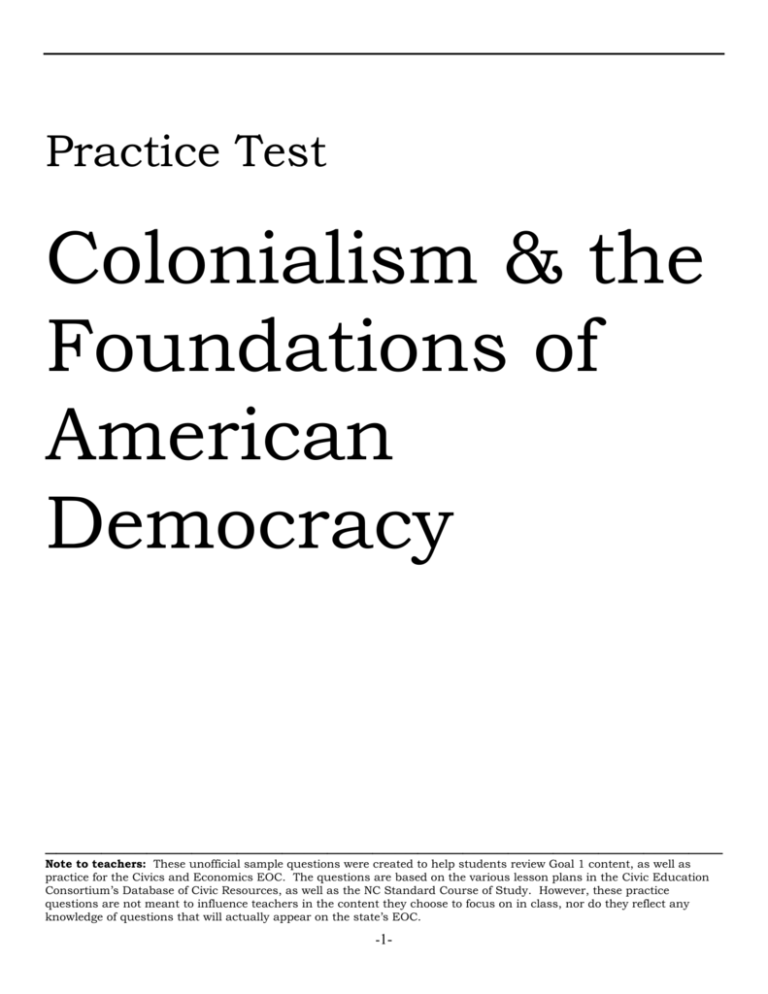
Practice Test Colonialism & the Foundations of American Democracy ____________________________________________________________ Note to teachers: These unofficial sample questions were created to help students review Goal 1 content, as well as practice for the Civics and Economics EOC. The questions are based on the various lesson plans in the Civic Education Consortium’s Database of Civic Resources, as well as the NC Standard Course of Study. However, these practice questions are not meant to influence teachers in the content they choose to focus on in class, nor do they reflect any knowledge of questions that will actually appear on the state’s EOC. -1- 1. Which colonies would most likely have had cash crops and large plantations? 5. Which group of colonies had the best soil and best climate for growing crops? A. New Jersey and North Carolina A. Northern B. Maryland and Georgia B. New England C. Rhode Island and Massachusetts C. Middle D. New York and Virginia D. Southern 2. Which one of the following is NOT one of the four cash crops? 6. Which group of people left England because they wanted to purify the English church? A. Tobacco A. Puritans B. Cotton B. Quakers C. Wheat C. Pilgrims D. Indigo D. Indentured Servants 3. Which group of colonies were known as the “breadbasket”? 7. Which document introduced the idea of limited government? A. New England A. Fundamental Orders of Connecticut B. Middle B. Magna Carta C. Southern C. English Bill of Rights D. Northern D. Mayflower Compact 4. Which term best describes the practice of creating and maintaining wealth by carefully controlling trade? 8. Thomas Paine encouraged the American Colonies to declare their independence from Great Britain by writing which one of the following? A. Economic Growth A. Common Sense B. Smuggling B. Olive Branch Petition C. Triangular Trade C. Federalist Papers D. Mercantilism D. Bill of Rights -2- 9. Which of the following is the most important reason why Pilgrims came to America? 12. According to John Locke, why do people choose to live under governmental rule? A. To find gold A. The government will protect citizens from foreign enemies. B. To trade with the Indians B. The government will provide justice for all citizens. C. The government will protect the life, liberty, and property of all citizens. D. The government will join all states together into one unified union. C. Freedom of the press D. To secure religious liberties 10. Which of the following describes a significant feature of the Mayflower Compact? A. B. Established the principle of self government in Plymouth Colony 13. Which of the following was the first representative government in colonial America? Defined the essential spirit of the Declaration of Independence C. Was the first attempt by the colonists to resist English law. D. Did not apply to governments outside of Virginia A. Virginia House of Burgesses B. New England Town Meetings C. Congress D. Parliament 11. Which colony was the first to have a written constitution? 14. Which philosopher thought that there should be a separation between religion and government? A. Connecticut A. Thomas Paine B. New York B. Voltaire C. Massachusetts C. Montesquieu D. North Carolina D. John Locke -3- 19. The French and Indian War created which of the following problems for Great Britain? 15. The issue or event that most directly led to the American Revolution was: A. A freedom of speech and press B. Taxation by Britain without representation C. African Slave Trade D. French and Indian War B. D. Toleration Act A. Calling for war with England B. Invading French Canada A large war debt D. Loss of Indian allies A. Intolerable Act B. Stamp Act C. Navigation Act D. Tea Act A. The Stamp Act B. Boston Tea Party C. Quartering Act D. Lexington and Concord Organized boycotts of British goods Passing the Coercive Acts 22. A justification for the American Revolution can be found in which of the following historical documents? 18. What was the Boston Tea Party? A. A colonial social custom B. A major battle of the American Revolution D. C. 21. What is known as the official beginning of the American Revolution? 17. American Colonists protested the taxes on colonial goods and British Imports by: C. The loss of colonies in North America Stamp Act Navigation Act D. B. Quartering Act C. C. A French Controlled North America 20. Which act said that all shipments had to travel through British Ports? 16. Which of the following was not a long term cause of the American Revolutionary War? A. A. A. Mayflower Compact B. Fundamental Orders of Connecticut A party given by the Governor of Massachusetts C. Constitution A protest against English trade regulations D. Declaration of Independence -4- 23. Though the Colonists did not object to paying the British taxes, they objected to taxes based upon which of the following? A. B. 26. Which compromise at the Constitutional Convention led to representation in the lower house being allocated in proportion to state population and representation in the upper house set at two representatives per state? The Colonies had no representation in the British Government The British government required all taxes to be paid in gold. C. The Royal Colonial Governors required their taxes be paid in gold D. The Colonists had very little gold coinage with which to pay the taxes. A. Great Compromise B. New Jersey Plan C. Virginia Plan D. Compromise of 1850 27. Which of the following was an important contribution by the New Jersey Plan to the creation of the Constitution? 24. Who was the primary author of the Declaration of Independence? A. The creation of a bicameral Congress B. Equal representation for all states in the Senate A. George Washington B. John Jay C. John Hancock C. The cessation of the slave trade D. Thomas Jefferson D. The Three Fifths Compromise 25. Which statement best describes the principle underlying the Declaration of Independence? A. B. C. D. 28. Which set of terms best describes the weaknesses of the new government under the Articles of Confederation? Government power comes from the consent of the governed Government power should be exercised by a monarch Government power belongs to a select group of people Government power should be controlled by the Parliament -5- A. Thirteen tax and trade systems B. Thirteen social and religious systems C. One national government D. Two documents defining conflicts 29. How was the continuing debate between the Federalist and Anti-Federalists conducted? 32. Which statement best expresses why many Americans were wary of a strong central government? A. By news from the town crier A. People remembered how the King of England ruled the colonies B. By fliers in the towns B. C. With essays in the newspapers The colonies had never had a strong government D. By letters sent to the enemies C. Colonial legislatures were weak and ineffective 30. The Anti-Federalists agreed to ratify the Constitution when which one of the following was added? D. The colonies were eager to form a confederation of states A. A tax on income 33. What is the name given to the first ten amendments to the Constitution? B. The right to vote for all citizens C. The Bill of Rights D. th People’s Rights and Freedoms B. The Declaration of Rights C. The Bill of Rights D. The Fundamental Rights of Man th The 15 through 25 Amendments 31. Which one of the following was a reason why the Anti-Federalists were opposed to the Constitution? A. There was no established church B. Too much emphasis was placed on individual rights C. The president was not given enough executive powers D. A. 34. Which amendment protects against unreasonable searches and seizures? The central government was given too much power -6- A. First Amendment B. Fourth Amendment C. Fifth Amendment D. Tenth Amendment 35. Which amendment allows for the forming of militias and the right to bear arms? 38. A Democracy is a form of government in which the supreme power is retained by: A. First Amendment A. The President B. Second Amendment B. The Supreme Court C. Seventh Amendment C. The Military D. Ninth Amendment D. The People 36. Which is the correct order of when the following documents were created (first to last)? 39. Which form of government is ruled by religious leaders? A. Bill of Rights, Articles of Confederation, U.S. Constitution, Declaration of Independence A. Oligarchy B. Theocracy Declaration of Independence, Bill of Rights, U.S. Constitution, Articles of Confederation C. Totalitarianism D. Monarchy B. C. D. Declaration of Independence, Articles of Confederation, U.S. Constitution, Bill of Rights 40. A person who rules with absolute power is called a ____________________ Articles of Confederation, Declaration of Independence, Bill of Rights, U.S. Constitution 37. Which is a characteristic of the American system of government? A. Direct Democracy B. Representative Democracy C. Constitutional Monarchy D. Dictatorship -7- A. President B. Monarch C. Dictator D. Aristocrat Answer Key: 1. B 2. C 3. B 4. D 5. D 6. A 7. B 8. A 9. D 10. A 11. A 12. C 13. A 14. D 15. B 16. D 17. C 18. D 19. C 20. C 21. D 22. D 23. A 24. D 25. A 26. A 27. A 28. A 29. C 30. C 31. D 32. A 33. C 34. B 35. B 36. C 37. B 38. D 39. B 40. C -8-
